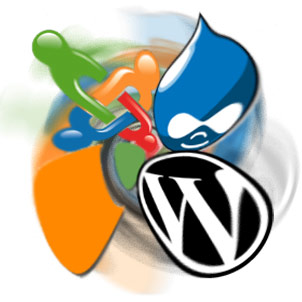Top Content Management Systems (CMS) for Building Your Website

If you have wanted to update your blog or website by yourself without technical support you might have heard of the benefits of CMS or content management systems.
A content management system (CMS) is a computer program that allows publishing, editing and modifying content as well as maintenance from a one place. It mainly helps non-technical people to update their own website, without having to know anything about coding.
There are many different content management tools used to build web solutions such as;
- Joomla
- Drupal
- WordPress
- ModX
- Concrete5
- Radiant CMS
- Cushy CMS
- SilverStripe
- TextPattern
- Frog CMS
Content management systems is a evolving technology that allows companies to link their information to customers quicker and cost effectively, in stead of relying on traditional means of updating website pages.
Why use a CMS for your website
Traditional website design and development involves Hard-code programming languages such as HTML, php, and dynamic effects using Flash, and HTML5 (Just a few of many). These are still adopted today,but it still means that a company is dependant on the developers for simple website updating functions.
Hard-code HTML web design is very fast and need of programming knowledge and special web server configuration. Even though you will need help from developers to set up a CMS tool and hosting of your website updating and managing the website thereon is easy and can be done after a few training sessions. This cuts down on the time and cost involved in requesting the developers to update the website for you. There are also supporting plugins and add-ons that help to integrate dynamic functions like advertisement placements, polling, document updating which can still be done without much technical support.
Here are some small descriptions about most popular three CMS tools and their advantages.
Joomla
Joomla is an open source content management system used for Corporate Web Sites, Newspapers, Magazines, Community based sites such as Church & School Sites, Charity or other non-profit organisations, Online Stores and Reservations and of course personal and Family sites.
Advantages of Joomla
- It is an open source CMS development kit that can be easily deployed
- It has multi-lingual support features
- SEO friendly with SEF plug-in
- There is an extensive admin panel in Joomla CMS. To mention few of its features
- User Management – Provides access control and authentication
- Media Manager – Helps to organize media files and directories
- Banner Manager – Helps to setup banners on your website
- Contact Manager – Helps to find the user contact information
Drupal
Drupal is a free, open-source web development platform for online content and user communities. And also Drupal is open-source software distributed under the GPL (“GNU General Public License”) and is maintained and developed by a community of thousands of users and developers. Drupal runs on any computing platform that supports both a web server capable of running PHP and a database to store content and settings.
Advantages of Drupal
- Easy to use and update: ( When it comes to updating, Drupal is easy to work with. Using a properly configured WYSIWYG editor like TinyMCE, you can even paste content from Word and have it take out all those tag peculiar to MS Word.)
- Search Engine Optimized
- Reliable and secure
- Drupal Has Extensive API Support
- Drupal Is Mobile Ready
WordPress
“WordPress is a free and open source blogging tool and a content management system (CMS) based on PHP and MySQL which runs on a web hosting service.”
WordPress is web platform you can use to create a beautiful website or blog. Currently, according to wordpress.org, there are over 25 million users worldwide. More and more people are choosing WordPress every day as it is a very accessible platform, easy to learn and the premium WordPress theme market has something to offer to everyone.
Advantages of WordPress
- Just a basic knowledge of some languages, such as PHP, HTML and CSS, can help you to alter an existing theme to make it your own
- SEO friendly: So there are lots of plugins available for WordPress which can extent WordPress reach
- Easy to use from a user point
- User can choose his own custom domain name instead of sub-domain name
- The WordPress community is large and vibrant, offering everything from tutorials to a vast amount of free plugins that can visually or technically enhance your website design
- If your company has a comparatively small website (a few hundred pages or less), WordPress is a great choice! Anyone with little knowledge of IT technologies will be able to install, maintain and update the site independently
How do I pick a CMS that will suit my business?
Each CMS tool will deliver different functionalities, therefore it is important to discuss the requirement with a professional web development company. For example most developers will recommend Joomla or Drupal for more complex websites, while simpler websites which are very content driven will adopt WordPress.
If you are interested in learning more, and want to develop a website using CMS tools contact BQu Services on This email address is being protected from spambots. You need JavaScript enabled to view it. today.
Created: July 19th, 2013




